NRS 2809: Mental Health Essay on Depression Case Study
VerifiedAdded on 2023/06/10
|11
|3086
|352
Essay
AI Summary
This essay analyzes a case study of a 75-year-old woman, Amy, residing in a retirement village, who is experiencing depression. The essay identifies and discusses various biopsychosocial factors contributing to her condition, including physical illnesses like diabetes and hypertension, the loss of her husband, social isolation, and a family history of depression. It explores nursing management and interventions, such as collaborative care models, pharmacological treatments with antidepressants, and psychotherapeutic approaches like Cognitive Behavioral Therapy (CBT) and Interpersonal Therapy (IPT). The essay also outlines and discusses the ethical implications associated with the treatment of depression, including patient safety, appropriate treatment modalities, and the restoration of self-agency. It emphasizes the importance of ethical decision-making and the complexities faced by clinicians in mental health care.
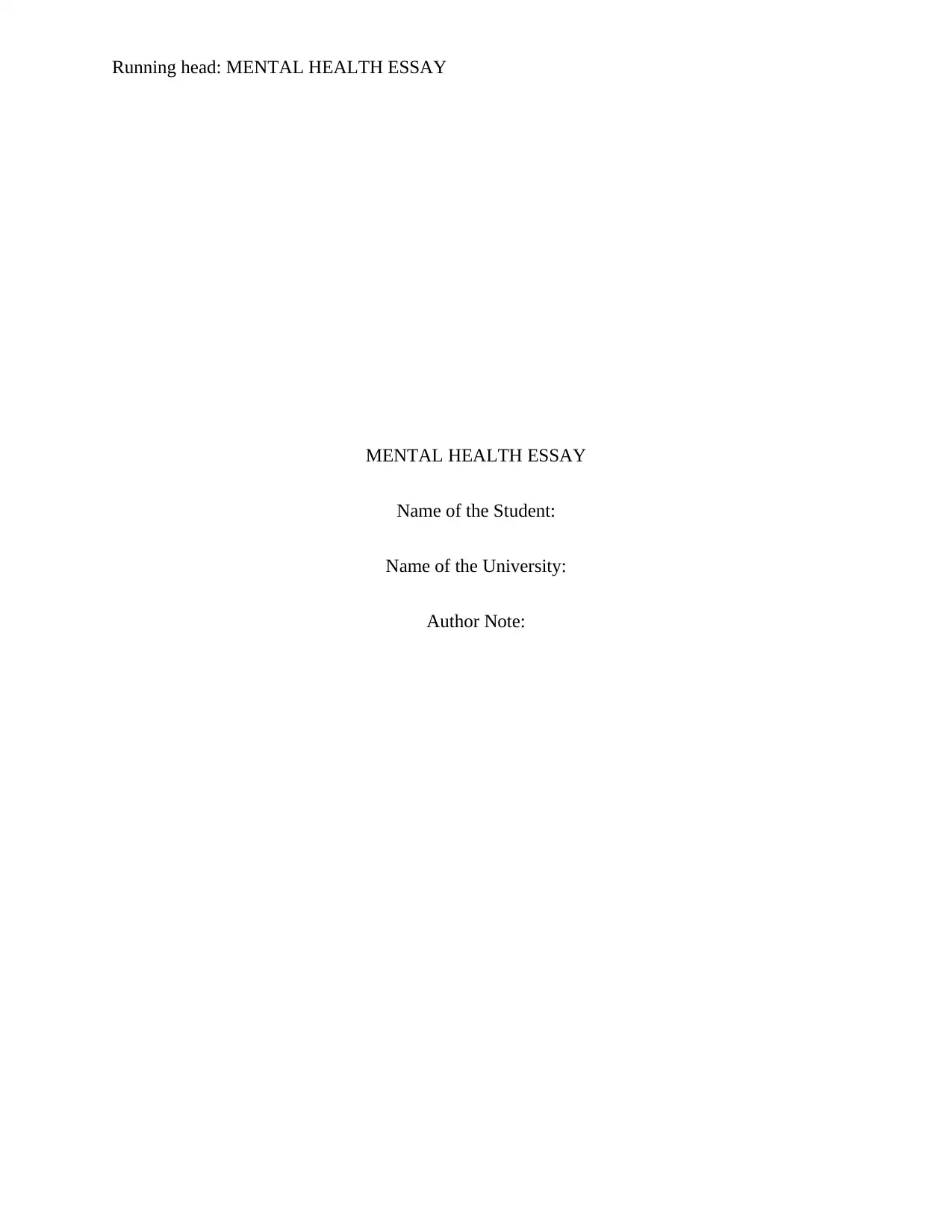
Running head: MENTAL HEALTH ESSAY
MENTAL HEALTH ESSAY
Name of the Student:
Name of the University:
Author Note:
MENTAL HEALTH ESSAY
Name of the Student:
Name of the University:
Author Note:
Paraphrase This Document
Need a fresh take? Get an instant paraphrase of this document with our AI Paraphraser
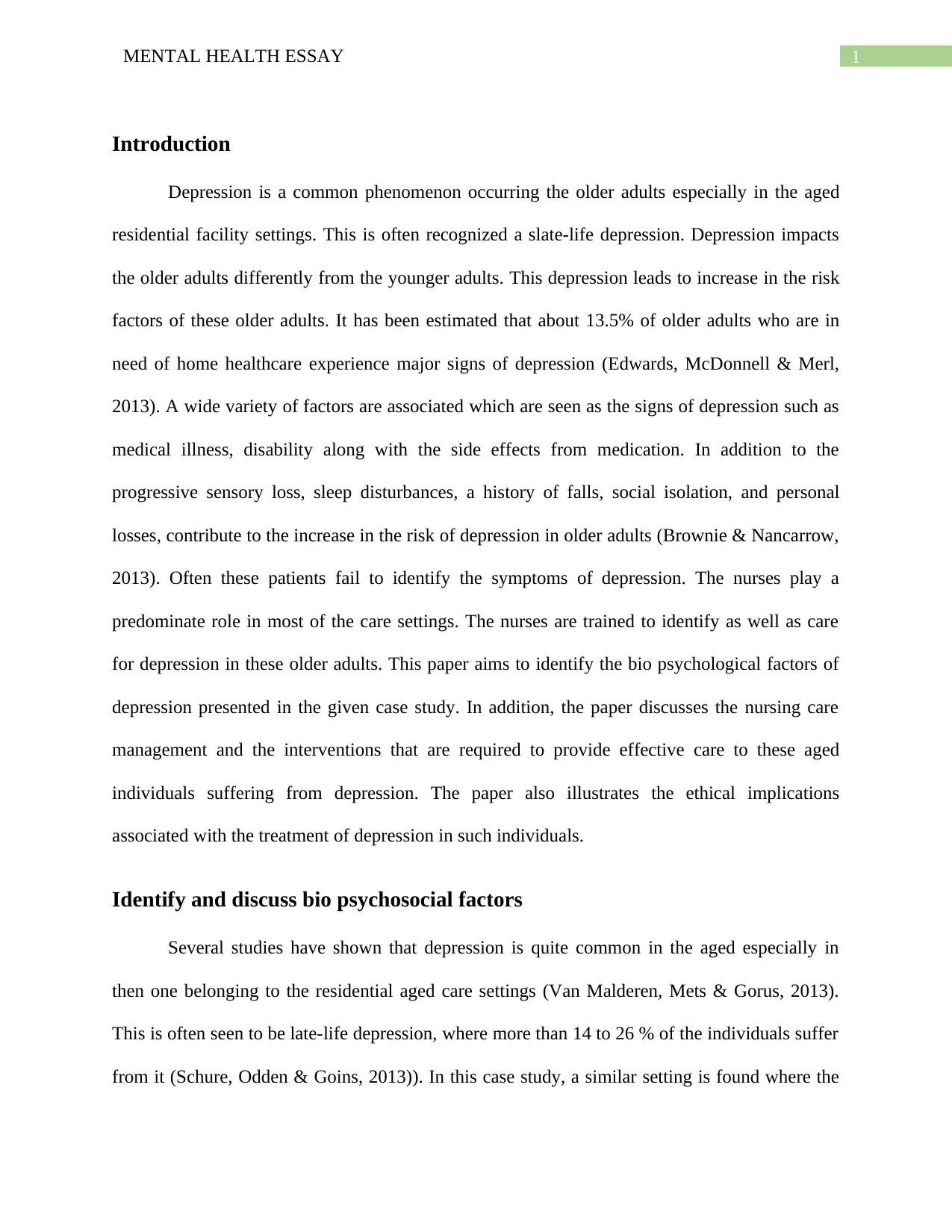
1MENTAL HEALTH ESSAY
Introduction
Depression is a common phenomenon occurring the older adults especially in the aged
residential facility settings. This is often recognized a slate-life depression. Depression impacts
the older adults differently from the younger adults. This depression leads to increase in the risk
factors of these older adults. It has been estimated that about 13.5% of older adults who are in
need of home healthcare experience major signs of depression (Edwards, McDonnell & Merl,
2013). A wide variety of factors are associated which are seen as the signs of depression such as
medical illness, disability along with the side effects from medication. In addition to the
progressive sensory loss, sleep disturbances, a history of falls, social isolation, and personal
losses, contribute to the increase in the risk of depression in older adults (Brownie & Nancarrow,
2013). Often these patients fail to identify the symptoms of depression. The nurses play a
predominate role in most of the care settings. The nurses are trained to identify as well as care
for depression in these older adults. This paper aims to identify the bio psychological factors of
depression presented in the given case study. In addition, the paper discusses the nursing care
management and the interventions that are required to provide effective care to these aged
individuals suffering from depression. The paper also illustrates the ethical implications
associated with the treatment of depression in such individuals.
Identify and discuss bio psychosocial factors
Several studies have shown that depression is quite common in the aged especially in
then one belonging to the residential aged care settings (Van Malderen, Mets & Gorus, 2013).
This is often seen to be late-life depression, where more than 14 to 26 % of the individuals suffer
from it (Schure, Odden & Goins, 2013)). In this case study, a similar setting is found where the
Introduction
Depression is a common phenomenon occurring the older adults especially in the aged
residential facility settings. This is often recognized a slate-life depression. Depression impacts
the older adults differently from the younger adults. This depression leads to increase in the risk
factors of these older adults. It has been estimated that about 13.5% of older adults who are in
need of home healthcare experience major signs of depression (Edwards, McDonnell & Merl,
2013). A wide variety of factors are associated which are seen as the signs of depression such as
medical illness, disability along with the side effects from medication. In addition to the
progressive sensory loss, sleep disturbances, a history of falls, social isolation, and personal
losses, contribute to the increase in the risk of depression in older adults (Brownie & Nancarrow,
2013). Often these patients fail to identify the symptoms of depression. The nurses play a
predominate role in most of the care settings. The nurses are trained to identify as well as care
for depression in these older adults. This paper aims to identify the bio psychological factors of
depression presented in the given case study. In addition, the paper discusses the nursing care
management and the interventions that are required to provide effective care to these aged
individuals suffering from depression. The paper also illustrates the ethical implications
associated with the treatment of depression in such individuals.
Identify and discuss bio psychosocial factors
Several studies have shown that depression is quite common in the aged especially in
then one belonging to the residential aged care settings (Van Malderen, Mets & Gorus, 2013).
This is often seen to be late-life depression, where more than 14 to 26 % of the individuals suffer
from it (Schure, Odden & Goins, 2013)). In this case study, a similar setting is found where the
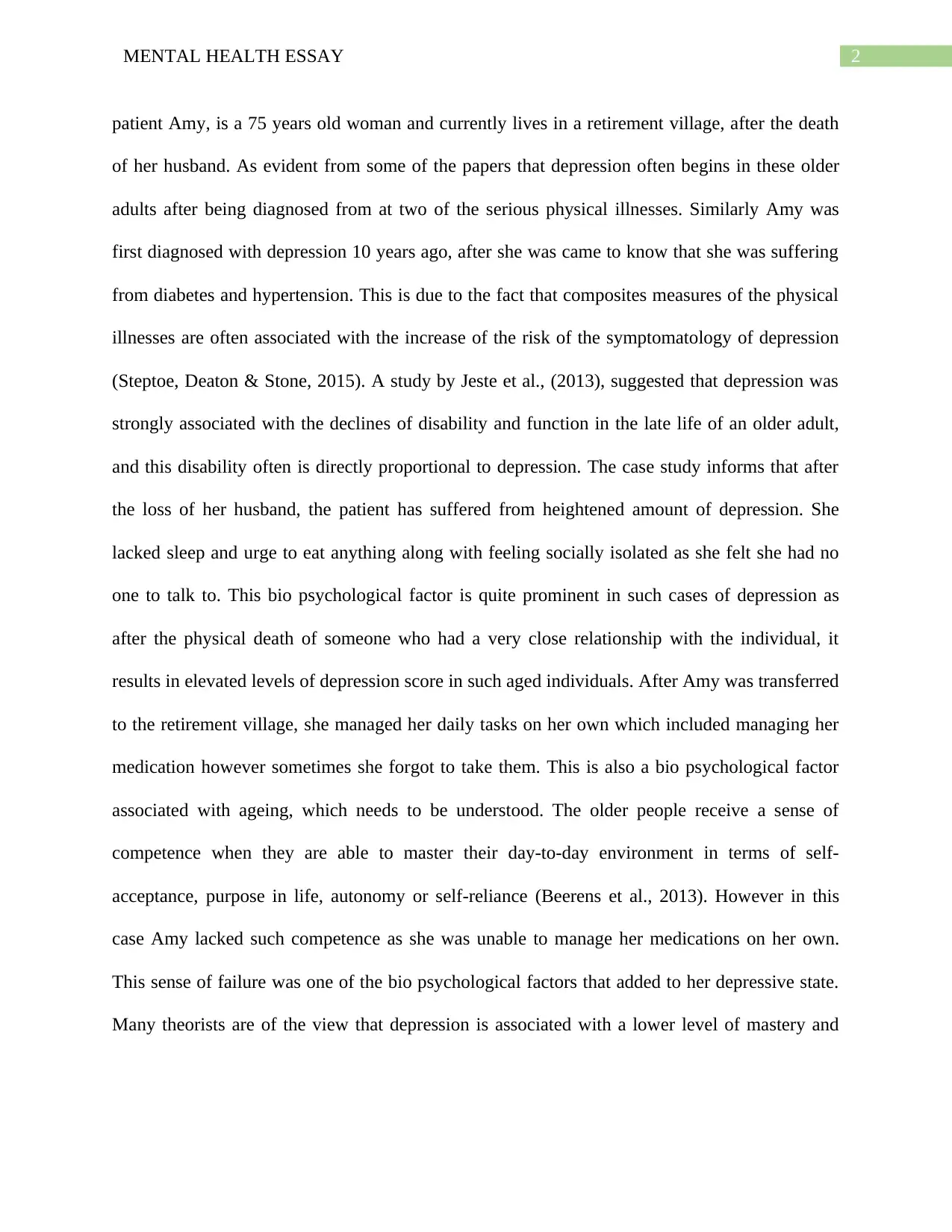
2MENTAL HEALTH ESSAY
patient Amy, is a 75 years old woman and currently lives in a retirement village, after the death
of her husband. As evident from some of the papers that depression often begins in these older
adults after being diagnosed from at two of the serious physical illnesses. Similarly Amy was
first diagnosed with depression 10 years ago, after she was came to know that she was suffering
from diabetes and hypertension. This is due to the fact that composites measures of the physical
illnesses are often associated with the increase of the risk of the symptomatology of depression
(Steptoe, Deaton & Stone, 2015). A study by Jeste et al., (2013), suggested that depression was
strongly associated with the declines of disability and function in the late life of an older adult,
and this disability often is directly proportional to depression. The case study informs that after
the loss of her husband, the patient has suffered from heightened amount of depression. She
lacked sleep and urge to eat anything along with feeling socially isolated as she felt she had no
one to talk to. This bio psychological factor is quite prominent in such cases of depression as
after the physical death of someone who had a very close relationship with the individual, it
results in elevated levels of depression score in such aged individuals. After Amy was transferred
to the retirement village, she managed her daily tasks on her own which included managing her
medication however sometimes she forgot to take them. This is also a bio psychological factor
associated with ageing, which needs to be understood. The older people receive a sense of
competence when they are able to master their day-to-day environment in terms of self-
acceptance, purpose in life, autonomy or self-reliance (Beerens et al., 2013). However in this
case Amy lacked such competence as she was unable to manage her medications on her own.
This sense of failure was one of the bio psychological factors that added to her depressive state.
Many theorists are of the view that depression is associated with a lower level of mastery and
patient Amy, is a 75 years old woman and currently lives in a retirement village, after the death
of her husband. As evident from some of the papers that depression often begins in these older
adults after being diagnosed from at two of the serious physical illnesses. Similarly Amy was
first diagnosed with depression 10 years ago, after she was came to know that she was suffering
from diabetes and hypertension. This is due to the fact that composites measures of the physical
illnesses are often associated with the increase of the risk of the symptomatology of depression
(Steptoe, Deaton & Stone, 2015). A study by Jeste et al., (2013), suggested that depression was
strongly associated with the declines of disability and function in the late life of an older adult,
and this disability often is directly proportional to depression. The case study informs that after
the loss of her husband, the patient has suffered from heightened amount of depression. She
lacked sleep and urge to eat anything along with feeling socially isolated as she felt she had no
one to talk to. This bio psychological factor is quite prominent in such cases of depression as
after the physical death of someone who had a very close relationship with the individual, it
results in elevated levels of depression score in such aged individuals. After Amy was transferred
to the retirement village, she managed her daily tasks on her own which included managing her
medication however sometimes she forgot to take them. This is also a bio psychological factor
associated with ageing, which needs to be understood. The older people receive a sense of
competence when they are able to master their day-to-day environment in terms of self-
acceptance, purpose in life, autonomy or self-reliance (Beerens et al., 2013). However in this
case Amy lacked such competence as she was unable to manage her medications on her own.
This sense of failure was one of the bio psychological factors that added to her depressive state.
Many theorists are of the view that depression is associated with a lower level of mastery and
⊘ This is a preview!⊘
Do you want full access?
Subscribe today to unlock all pages.

Trusted by 1+ million students worldwide
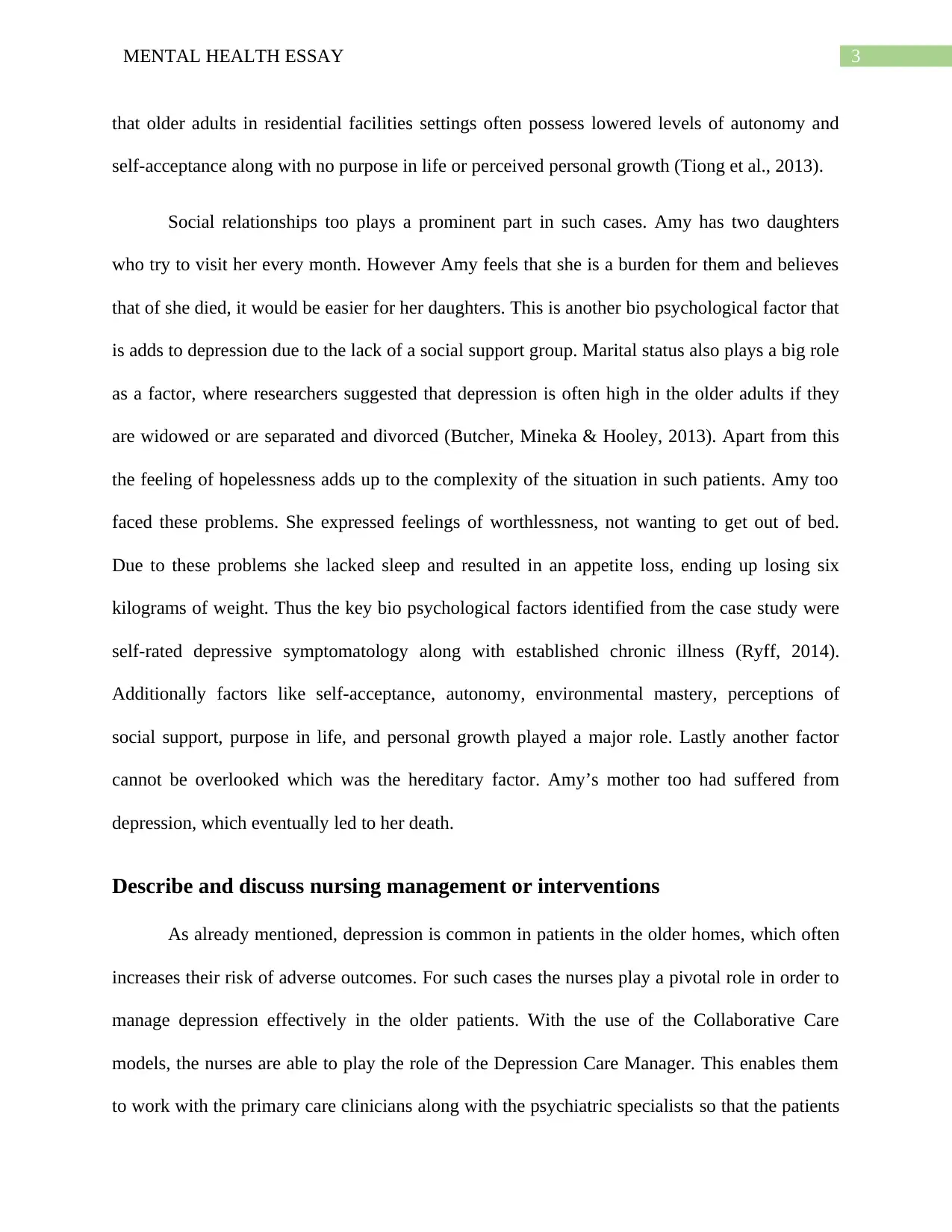
3MENTAL HEALTH ESSAY
that older adults in residential facilities settings often possess lowered levels of autonomy and
self-acceptance along with no purpose in life or perceived personal growth (Tiong et al., 2013).
Social relationships too plays a prominent part in such cases. Amy has two daughters
who try to visit her every month. However Amy feels that she is a burden for them and believes
that of she died, it would be easier for her daughters. This is another bio psychological factor that
is adds to depression due to the lack of a social support group. Marital status also plays a big role
as a factor, where researchers suggested that depression is often high in the older adults if they
are widowed or are separated and divorced (Butcher, Mineka & Hooley, 2013). Apart from this
the feeling of hopelessness adds up to the complexity of the situation in such patients. Amy too
faced these problems. She expressed feelings of worthlessness, not wanting to get out of bed.
Due to these problems she lacked sleep and resulted in an appetite loss, ending up losing six
kilograms of weight. Thus the key bio psychological factors identified from the case study were
self-rated depressive symptomatology along with established chronic illness (Ryff, 2014).
Additionally factors like self-acceptance, autonomy, environmental mastery, perceptions of
social support, purpose in life, and personal growth played a major role. Lastly another factor
cannot be overlooked which was the hereditary factor. Amy’s mother too had suffered from
depression, which eventually led to her death.
Describe and discuss nursing management or interventions
As already mentioned, depression is common in patients in the older homes, which often
increases their risk of adverse outcomes. For such cases the nurses play a pivotal role in order to
manage depression effectively in the older patients. With the use of the Collaborative Care
models, the nurses are able to play the role of the Depression Care Manager. This enables them
to work with the primary care clinicians along with the psychiatric specialists so that the patients
that older adults in residential facilities settings often possess lowered levels of autonomy and
self-acceptance along with no purpose in life or perceived personal growth (Tiong et al., 2013).
Social relationships too plays a prominent part in such cases. Amy has two daughters
who try to visit her every month. However Amy feels that she is a burden for them and believes
that of she died, it would be easier for her daughters. This is another bio psychological factor that
is adds to depression due to the lack of a social support group. Marital status also plays a big role
as a factor, where researchers suggested that depression is often high in the older adults if they
are widowed or are separated and divorced (Butcher, Mineka & Hooley, 2013). Apart from this
the feeling of hopelessness adds up to the complexity of the situation in such patients. Amy too
faced these problems. She expressed feelings of worthlessness, not wanting to get out of bed.
Due to these problems she lacked sleep and resulted in an appetite loss, ending up losing six
kilograms of weight. Thus the key bio psychological factors identified from the case study were
self-rated depressive symptomatology along with established chronic illness (Ryff, 2014).
Additionally factors like self-acceptance, autonomy, environmental mastery, perceptions of
social support, purpose in life, and personal growth played a major role. Lastly another factor
cannot be overlooked which was the hereditary factor. Amy’s mother too had suffered from
depression, which eventually led to her death.
Describe and discuss nursing management or interventions
As already mentioned, depression is common in patients in the older homes, which often
increases their risk of adverse outcomes. For such cases the nurses play a pivotal role in order to
manage depression effectively in the older patients. With the use of the Collaborative Care
models, the nurses are able to play the role of the Depression Care Manager. This enables them
to work with the primary care clinicians along with the psychiatric specialists so that the patients
Paraphrase This Document
Need a fresh take? Get an instant paraphrase of this document with our AI Paraphraser
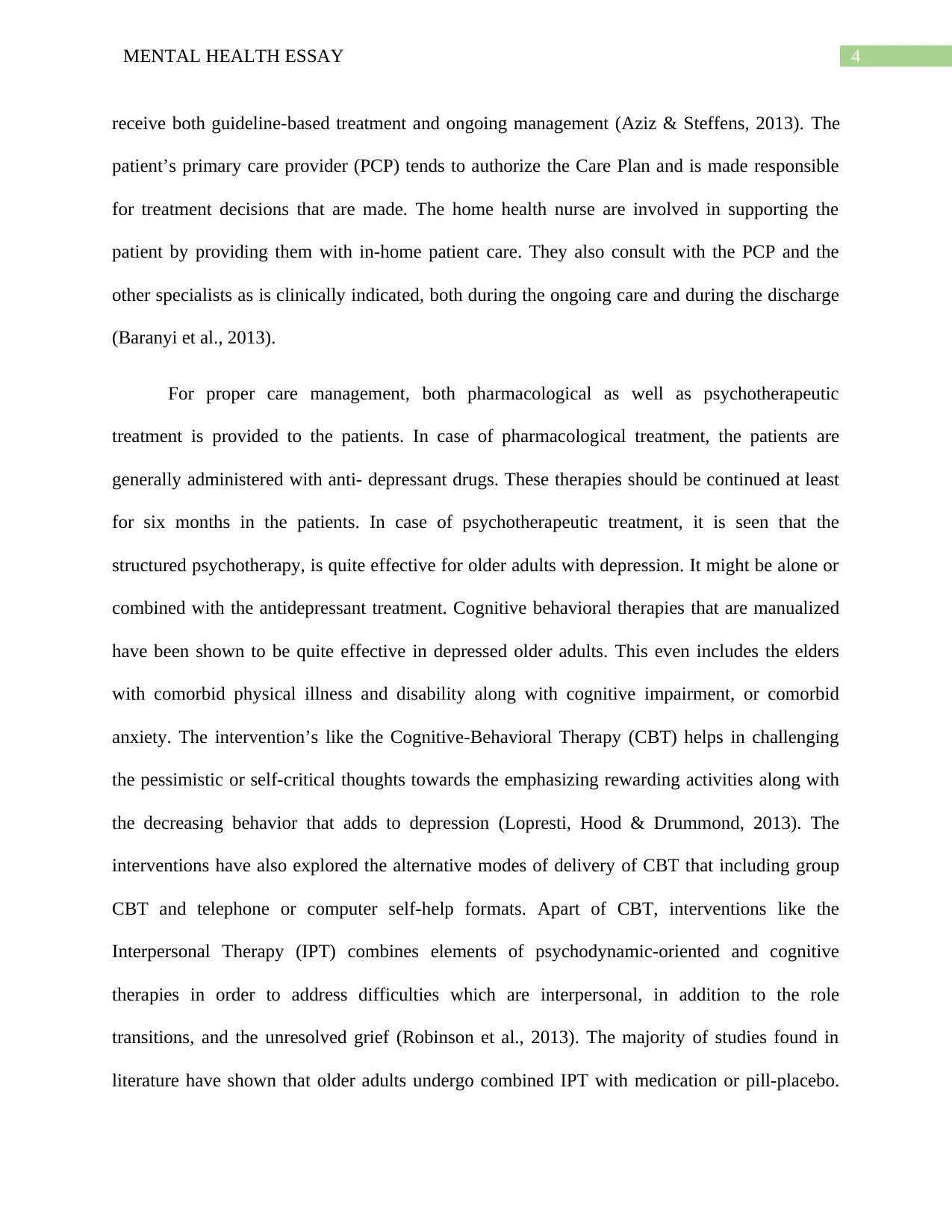
4MENTAL HEALTH ESSAY
receive both guideline-based treatment and ongoing management (Aziz & Steffens, 2013). The
patient’s primary care provider (PCP) tends to authorize the Care Plan and is made responsible
for treatment decisions that are made. The home health nurse are involved in supporting the
patient by providing them with in-home patient care. They also consult with the PCP and the
other specialists as is clinically indicated, both during the ongoing care and during the discharge
(Baranyi et al., 2013).
For proper care management, both pharmacological as well as psychotherapeutic
treatment is provided to the patients. In case of pharmacological treatment, the patients are
generally administered with anti- depressant drugs. These therapies should be continued at least
for six months in the patients. In case of psychotherapeutic treatment, it is seen that the
structured psychotherapy, is quite effective for older adults with depression. It might be alone or
combined with the antidepressant treatment. Cognitive behavioral therapies that are manualized
have been shown to be quite effective in depressed older adults. This even includes the elders
with comorbid physical illness and disability along with cognitive impairment, or comorbid
anxiety. The intervention’s like the Cognitive-Behavioral Therapy (CBT) helps in challenging
the pessimistic or self-critical thoughts towards the emphasizing rewarding activities along with
the decreasing behavior that adds to depression (Lopresti, Hood & Drummond, 2013). The
interventions have also explored the alternative modes of delivery of CBT that including group
CBT and telephone or computer self-help formats. Apart of CBT, interventions like the
Interpersonal Therapy (IPT) combines elements of psychodynamic-oriented and cognitive
therapies in order to address difficulties which are interpersonal, in addition to the role
transitions, and the unresolved grief (Robinson et al., 2013). The majority of studies found in
literature have shown that older adults undergo combined IPT with medication or pill-placebo.
receive both guideline-based treatment and ongoing management (Aziz & Steffens, 2013). The
patient’s primary care provider (PCP) tends to authorize the Care Plan and is made responsible
for treatment decisions that are made. The home health nurse are involved in supporting the
patient by providing them with in-home patient care. They also consult with the PCP and the
other specialists as is clinically indicated, both during the ongoing care and during the discharge
(Baranyi et al., 2013).
For proper care management, both pharmacological as well as psychotherapeutic
treatment is provided to the patients. In case of pharmacological treatment, the patients are
generally administered with anti- depressant drugs. These therapies should be continued at least
for six months in the patients. In case of psychotherapeutic treatment, it is seen that the
structured psychotherapy, is quite effective for older adults with depression. It might be alone or
combined with the antidepressant treatment. Cognitive behavioral therapies that are manualized
have been shown to be quite effective in depressed older adults. This even includes the elders
with comorbid physical illness and disability along with cognitive impairment, or comorbid
anxiety. The intervention’s like the Cognitive-Behavioral Therapy (CBT) helps in challenging
the pessimistic or self-critical thoughts towards the emphasizing rewarding activities along with
the decreasing behavior that adds to depression (Lopresti, Hood & Drummond, 2013). The
interventions have also explored the alternative modes of delivery of CBT that including group
CBT and telephone or computer self-help formats. Apart of CBT, interventions like the
Interpersonal Therapy (IPT) combines elements of psychodynamic-oriented and cognitive
therapies in order to address difficulties which are interpersonal, in addition to the role
transitions, and the unresolved grief (Robinson et al., 2013). The majority of studies found in
literature have shown that older adults undergo combined IPT with medication or pill-placebo.
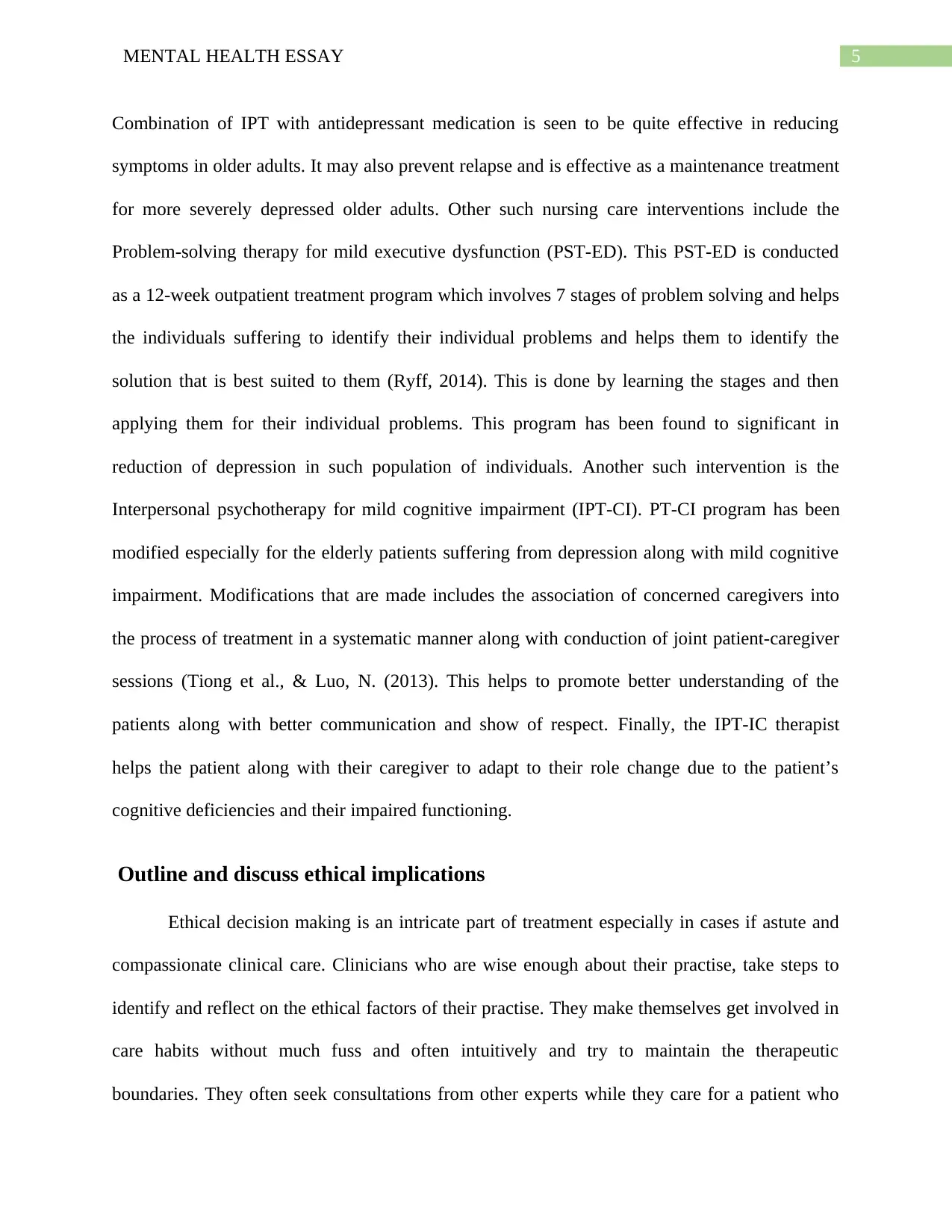
5MENTAL HEALTH ESSAY
Combination of IPT with antidepressant medication is seen to be quite effective in reducing
symptoms in older adults. It may also prevent relapse and is effective as a maintenance treatment
for more severely depressed older adults. Other such nursing care interventions include the
Problem-solving therapy for mild executive dysfunction (PST-ED). This PST-ED is conducted
as a 12-week outpatient treatment program which involves 7 stages of problem solving and helps
the individuals suffering to identify their individual problems and helps them to identify the
solution that is best suited to them (Ryff, 2014). This is done by learning the stages and then
applying them for their individual problems. This program has been found to significant in
reduction of depression in such population of individuals. Another such intervention is the
Interpersonal psychotherapy for mild cognitive impairment (IPT-CI). PT-CI program has been
modified especially for the elderly patients suffering from depression along with mild cognitive
impairment. Modifications that are made includes the association of concerned caregivers into
the process of treatment in a systematic manner along with conduction of joint patient-caregiver
sessions (Tiong et al., & Luo, N. (2013). This helps to promote better understanding of the
patients along with better communication and show of respect. Finally, the IPT-IC therapist
helps the patient along with their caregiver to adapt to their role change due to the patient’s
cognitive deficiencies and their impaired functioning.
Outline and discuss ethical implications
Ethical decision making is an intricate part of treatment especially in cases if astute and
compassionate clinical care. Clinicians who are wise enough about their practise, take steps to
identify and reflect on the ethical factors of their practise. They make themselves get involved in
care habits without much fuss and often intuitively and try to maintain the therapeutic
boundaries. They often seek consultations from other experts while they care for a patient who
Combination of IPT with antidepressant medication is seen to be quite effective in reducing
symptoms in older adults. It may also prevent relapse and is effective as a maintenance treatment
for more severely depressed older adults. Other such nursing care interventions include the
Problem-solving therapy for mild executive dysfunction (PST-ED). This PST-ED is conducted
as a 12-week outpatient treatment program which involves 7 stages of problem solving and helps
the individuals suffering to identify their individual problems and helps them to identify the
solution that is best suited to them (Ryff, 2014). This is done by learning the stages and then
applying them for their individual problems. This program has been found to significant in
reduction of depression in such population of individuals. Another such intervention is the
Interpersonal psychotherapy for mild cognitive impairment (IPT-CI). PT-CI program has been
modified especially for the elderly patients suffering from depression along with mild cognitive
impairment. Modifications that are made includes the association of concerned caregivers into
the process of treatment in a systematic manner along with conduction of joint patient-caregiver
sessions (Tiong et al., & Luo, N. (2013). This helps to promote better understanding of the
patients along with better communication and show of respect. Finally, the IPT-IC therapist
helps the patient along with their caregiver to adapt to their role change due to the patient’s
cognitive deficiencies and their impaired functioning.
Outline and discuss ethical implications
Ethical decision making is an intricate part of treatment especially in cases if astute and
compassionate clinical care. Clinicians who are wise enough about their practise, take steps to
identify and reflect on the ethical factors of their practise. They make themselves get involved in
care habits without much fuss and often intuitively and try to maintain the therapeutic
boundaries. They often seek consultations from other experts while they care for a patient who
⊘ This is a preview!⊘
Do you want full access?
Subscribe today to unlock all pages.

Trusted by 1+ million students worldwide
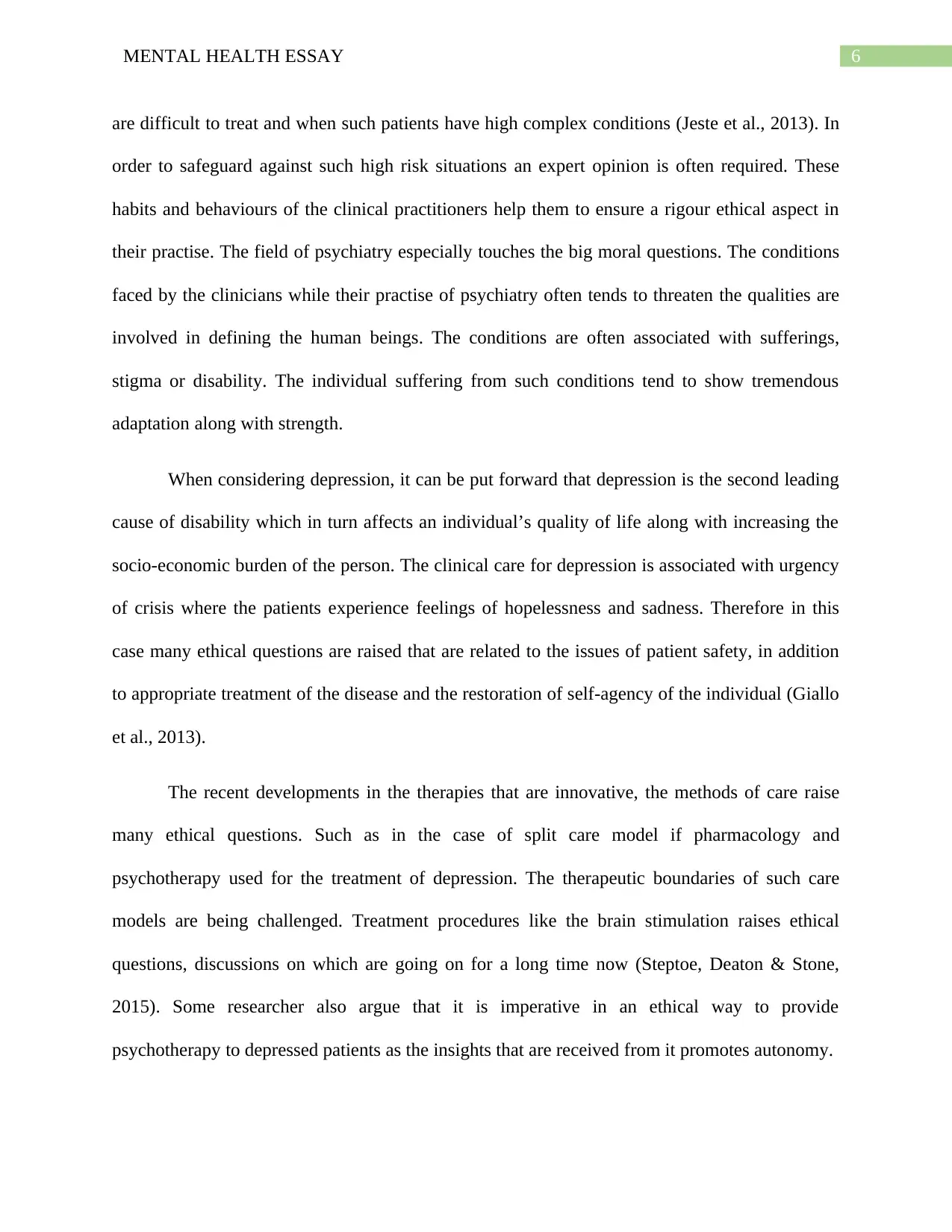
6MENTAL HEALTH ESSAY
are difficult to treat and when such patients have high complex conditions (Jeste et al., 2013). In
order to safeguard against such high risk situations an expert opinion is often required. These
habits and behaviours of the clinical practitioners help them to ensure a rigour ethical aspect in
their practise. The field of psychiatry especially touches the big moral questions. The conditions
faced by the clinicians while their practise of psychiatry often tends to threaten the qualities are
involved in defining the human beings. The conditions are often associated with sufferings,
stigma or disability. The individual suffering from such conditions tend to show tremendous
adaptation along with strength.
When considering depression, it can be put forward that depression is the second leading
cause of disability which in turn affects an individual’s quality of life along with increasing the
socio-economic burden of the person. The clinical care for depression is associated with urgency
of crisis where the patients experience feelings of hopelessness and sadness. Therefore in this
case many ethical questions are raised that are related to the issues of patient safety, in addition
to appropriate treatment of the disease and the restoration of self-agency of the individual (Giallo
et al., 2013).
The recent developments in the therapies that are innovative, the methods of care raise
many ethical questions. Such as in the case of split care model if pharmacology and
psychotherapy used for the treatment of depression. The therapeutic boundaries of such care
models are being challenged. Treatment procedures like the brain stimulation raises ethical
questions, discussions on which are going on for a long time now (Steptoe, Deaton & Stone,
2015). Some researcher also argue that it is imperative in an ethical way to provide
psychotherapy to depressed patients as the insights that are received from it promotes autonomy.
are difficult to treat and when such patients have high complex conditions (Jeste et al., 2013). In
order to safeguard against such high risk situations an expert opinion is often required. These
habits and behaviours of the clinical practitioners help them to ensure a rigour ethical aspect in
their practise. The field of psychiatry especially touches the big moral questions. The conditions
faced by the clinicians while their practise of psychiatry often tends to threaten the qualities are
involved in defining the human beings. The conditions are often associated with sufferings,
stigma or disability. The individual suffering from such conditions tend to show tremendous
adaptation along with strength.
When considering depression, it can be put forward that depression is the second leading
cause of disability which in turn affects an individual’s quality of life along with increasing the
socio-economic burden of the person. The clinical care for depression is associated with urgency
of crisis where the patients experience feelings of hopelessness and sadness. Therefore in this
case many ethical questions are raised that are related to the issues of patient safety, in addition
to appropriate treatment of the disease and the restoration of self-agency of the individual (Giallo
et al., 2013).
The recent developments in the therapies that are innovative, the methods of care raise
many ethical questions. Such as in the case of split care model if pharmacology and
psychotherapy used for the treatment of depression. The therapeutic boundaries of such care
models are being challenged. Treatment procedures like the brain stimulation raises ethical
questions, discussions on which are going on for a long time now (Steptoe, Deaton & Stone,
2015). Some researcher also argue that it is imperative in an ethical way to provide
psychotherapy to depressed patients as the insights that are received from it promotes autonomy.
Paraphrase This Document
Need a fresh take? Get an instant paraphrase of this document with our AI Paraphraser
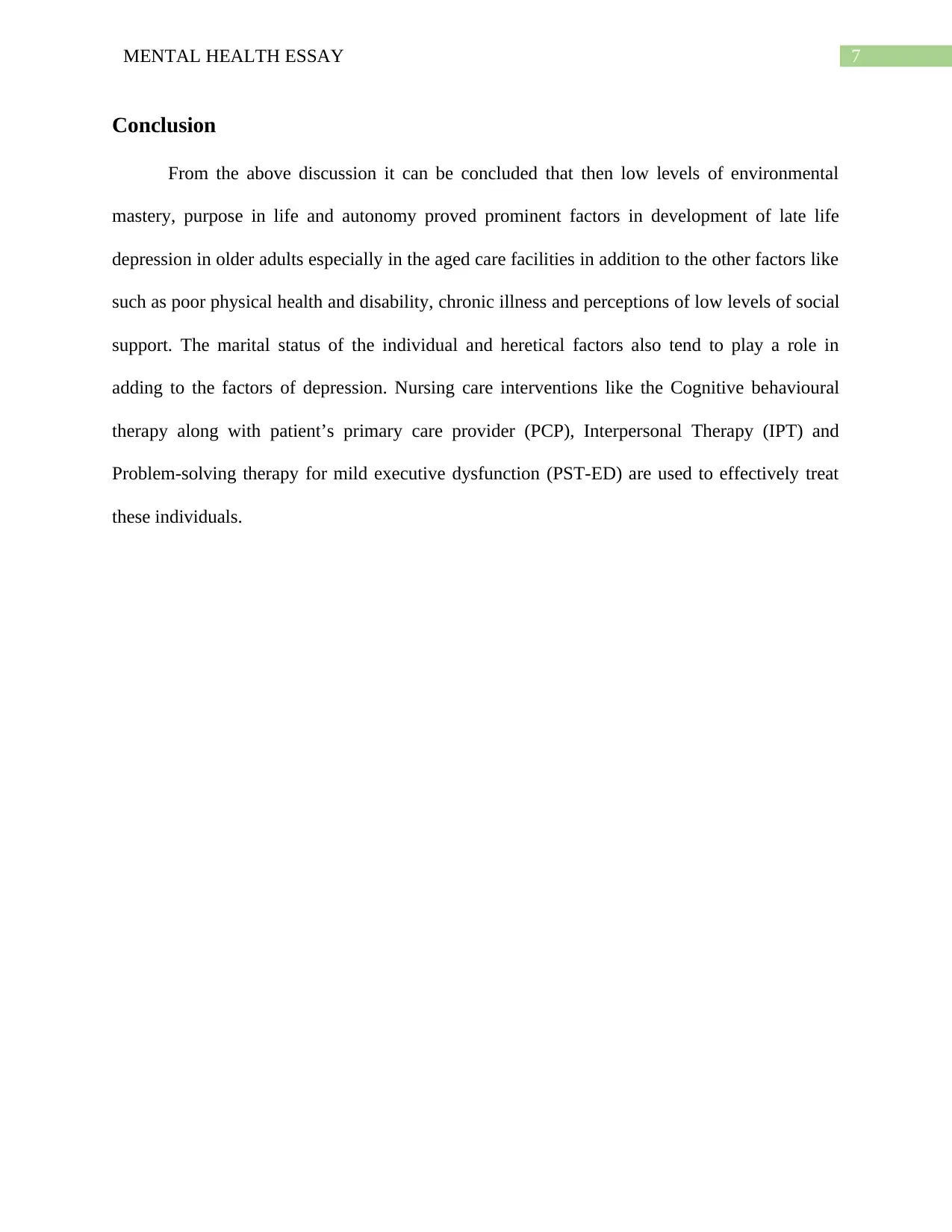
7MENTAL HEALTH ESSAY
Conclusion
From the above discussion it can be concluded that then low levels of environmental
mastery, purpose in life and autonomy proved prominent factors in development of late life
depression in older adults especially in the aged care facilities in addition to the other factors like
such as poor physical health and disability, chronic illness and perceptions of low levels of social
support. The marital status of the individual and heretical factors also tend to play a role in
adding to the factors of depression. Nursing care interventions like the Cognitive behavioural
therapy along with patient’s primary care provider (PCP), Interpersonal Therapy (IPT) and
Problem-solving therapy for mild executive dysfunction (PST-ED) are used to effectively treat
these individuals.
Conclusion
From the above discussion it can be concluded that then low levels of environmental
mastery, purpose in life and autonomy proved prominent factors in development of late life
depression in older adults especially in the aged care facilities in addition to the other factors like
such as poor physical health and disability, chronic illness and perceptions of low levels of social
support. The marital status of the individual and heretical factors also tend to play a role in
adding to the factors of depression. Nursing care interventions like the Cognitive behavioural
therapy along with patient’s primary care provider (PCP), Interpersonal Therapy (IPT) and
Problem-solving therapy for mild executive dysfunction (PST-ED) are used to effectively treat
these individuals.
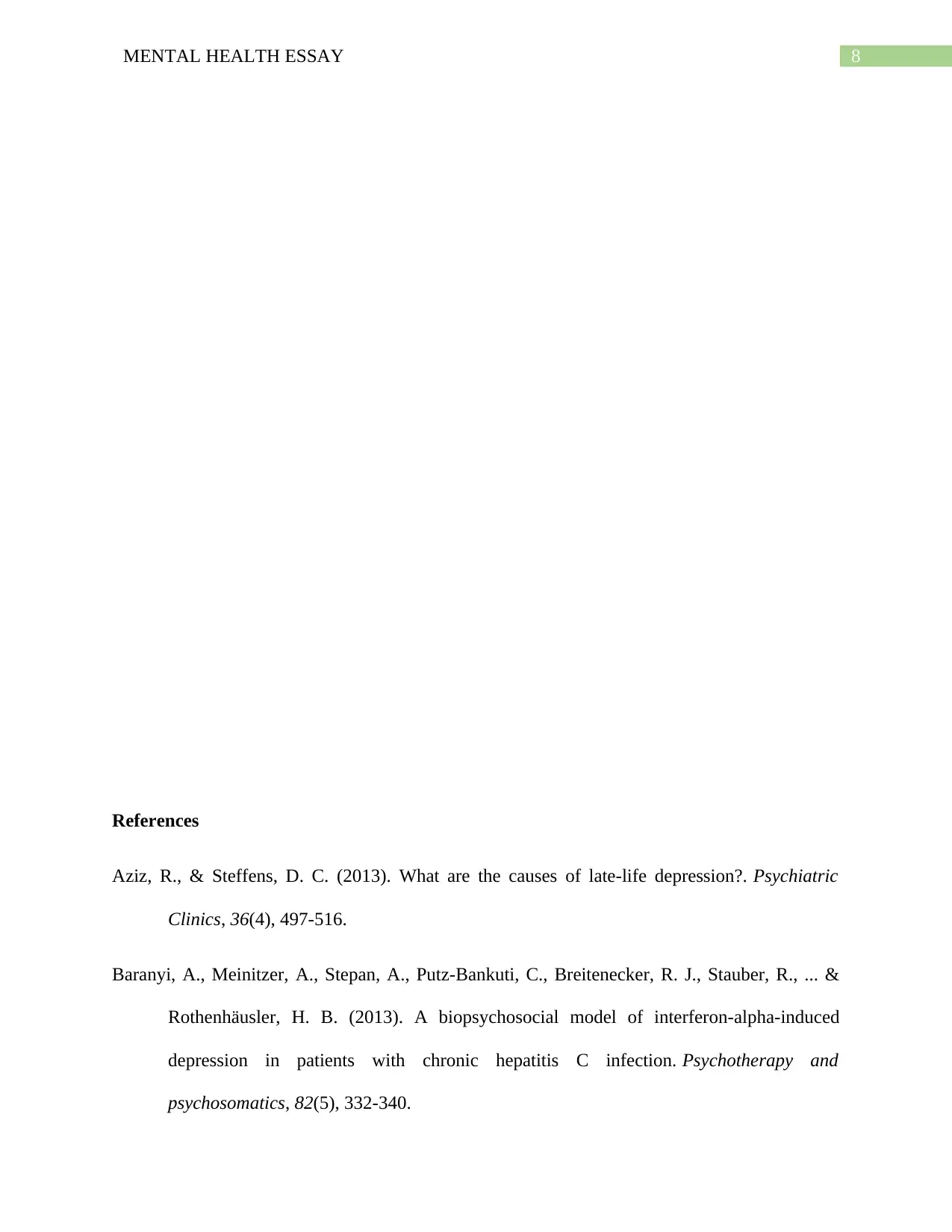
8MENTAL HEALTH ESSAY
References
Aziz, R., & Steffens, D. C. (2013). What are the causes of late-life depression?. Psychiatric
Clinics, 36(4), 497-516.
Baranyi, A., Meinitzer, A., Stepan, A., Putz-Bankuti, C., Breitenecker, R. J., Stauber, R., ... &
Rothenhäusler, H. B. (2013). A biopsychosocial model of interferon-alpha-induced
depression in patients with chronic hepatitis C infection. Psychotherapy and
psychosomatics, 82(5), 332-340.
References
Aziz, R., & Steffens, D. C. (2013). What are the causes of late-life depression?. Psychiatric
Clinics, 36(4), 497-516.
Baranyi, A., Meinitzer, A., Stepan, A., Putz-Bankuti, C., Breitenecker, R. J., Stauber, R., ... &
Rothenhäusler, H. B. (2013). A biopsychosocial model of interferon-alpha-induced
depression in patients with chronic hepatitis C infection. Psychotherapy and
psychosomatics, 82(5), 332-340.
⊘ This is a preview!⊘
Do you want full access?
Subscribe today to unlock all pages.

Trusted by 1+ million students worldwide
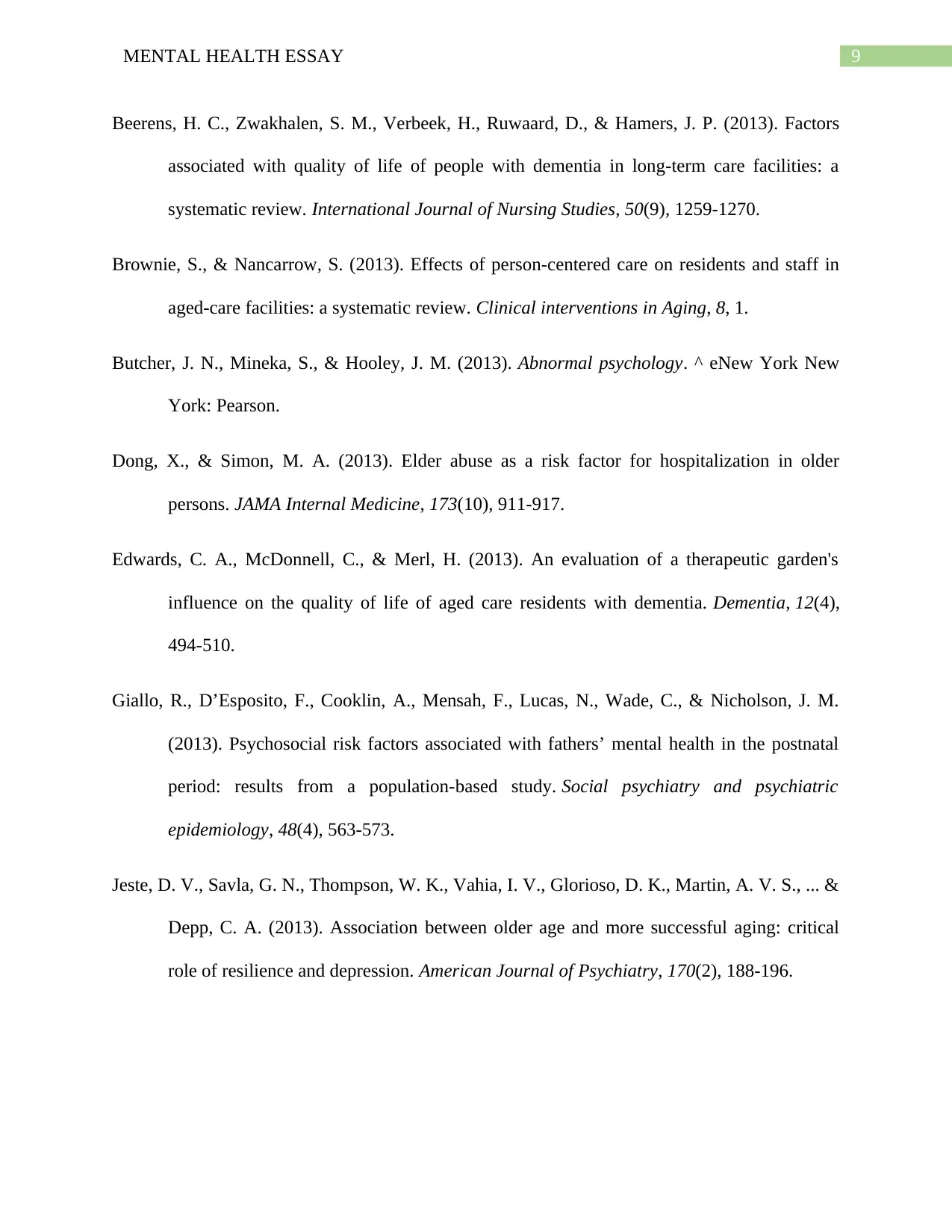
9MENTAL HEALTH ESSAY
Beerens, H. C., Zwakhalen, S. M., Verbeek, H., Ruwaard, D., & Hamers, J. P. (2013). Factors
associated with quality of life of people with dementia in long-term care facilities: a
systematic review. International Journal of Nursing Studies, 50(9), 1259-1270.
Brownie, S., & Nancarrow, S. (2013). Effects of person-centered care on residents and staff in
aged-care facilities: a systematic review. Clinical interventions in Aging, 8, 1.
Butcher, J. N., Mineka, S., & Hooley, J. M. (2013). Abnormal psychology. ^ eNew York New
York: Pearson.
Dong, X., & Simon, M. A. (2013). Elder abuse as a risk factor for hospitalization in older
persons. JAMA Internal Medicine, 173(10), 911-917.
Edwards, C. A., McDonnell, C., & Merl, H. (2013). An evaluation of a therapeutic garden's
influence on the quality of life of aged care residents with dementia. Dementia, 12(4),
494-510.
Giallo, R., D’Esposito, F., Cooklin, A., Mensah, F., Lucas, N., Wade, C., & Nicholson, J. M.
(2013). Psychosocial risk factors associated with fathers’ mental health in the postnatal
period: results from a population-based study. Social psychiatry and psychiatric
epidemiology, 48(4), 563-573.
Jeste, D. V., Savla, G. N., Thompson, W. K., Vahia, I. V., Glorioso, D. K., Martin, A. V. S., ... &
Depp, C. A. (2013). Association between older age and more successful aging: critical
role of resilience and depression. American Journal of Psychiatry, 170(2), 188-196.
Beerens, H. C., Zwakhalen, S. M., Verbeek, H., Ruwaard, D., & Hamers, J. P. (2013). Factors
associated with quality of life of people with dementia in long-term care facilities: a
systematic review. International Journal of Nursing Studies, 50(9), 1259-1270.
Brownie, S., & Nancarrow, S. (2013). Effects of person-centered care on residents and staff in
aged-care facilities: a systematic review. Clinical interventions in Aging, 8, 1.
Butcher, J. N., Mineka, S., & Hooley, J. M. (2013). Abnormal psychology. ^ eNew York New
York: Pearson.
Dong, X., & Simon, M. A. (2013). Elder abuse as a risk factor for hospitalization in older
persons. JAMA Internal Medicine, 173(10), 911-917.
Edwards, C. A., McDonnell, C., & Merl, H. (2013). An evaluation of a therapeutic garden's
influence on the quality of life of aged care residents with dementia. Dementia, 12(4),
494-510.
Giallo, R., D’Esposito, F., Cooklin, A., Mensah, F., Lucas, N., Wade, C., & Nicholson, J. M.
(2013). Psychosocial risk factors associated with fathers’ mental health in the postnatal
period: results from a population-based study. Social psychiatry and psychiatric
epidemiology, 48(4), 563-573.
Jeste, D. V., Savla, G. N., Thompson, W. K., Vahia, I. V., Glorioso, D. K., Martin, A. V. S., ... &
Depp, C. A. (2013). Association between older age and more successful aging: critical
role of resilience and depression. American Journal of Psychiatry, 170(2), 188-196.
Paraphrase This Document
Need a fresh take? Get an instant paraphrase of this document with our AI Paraphraser
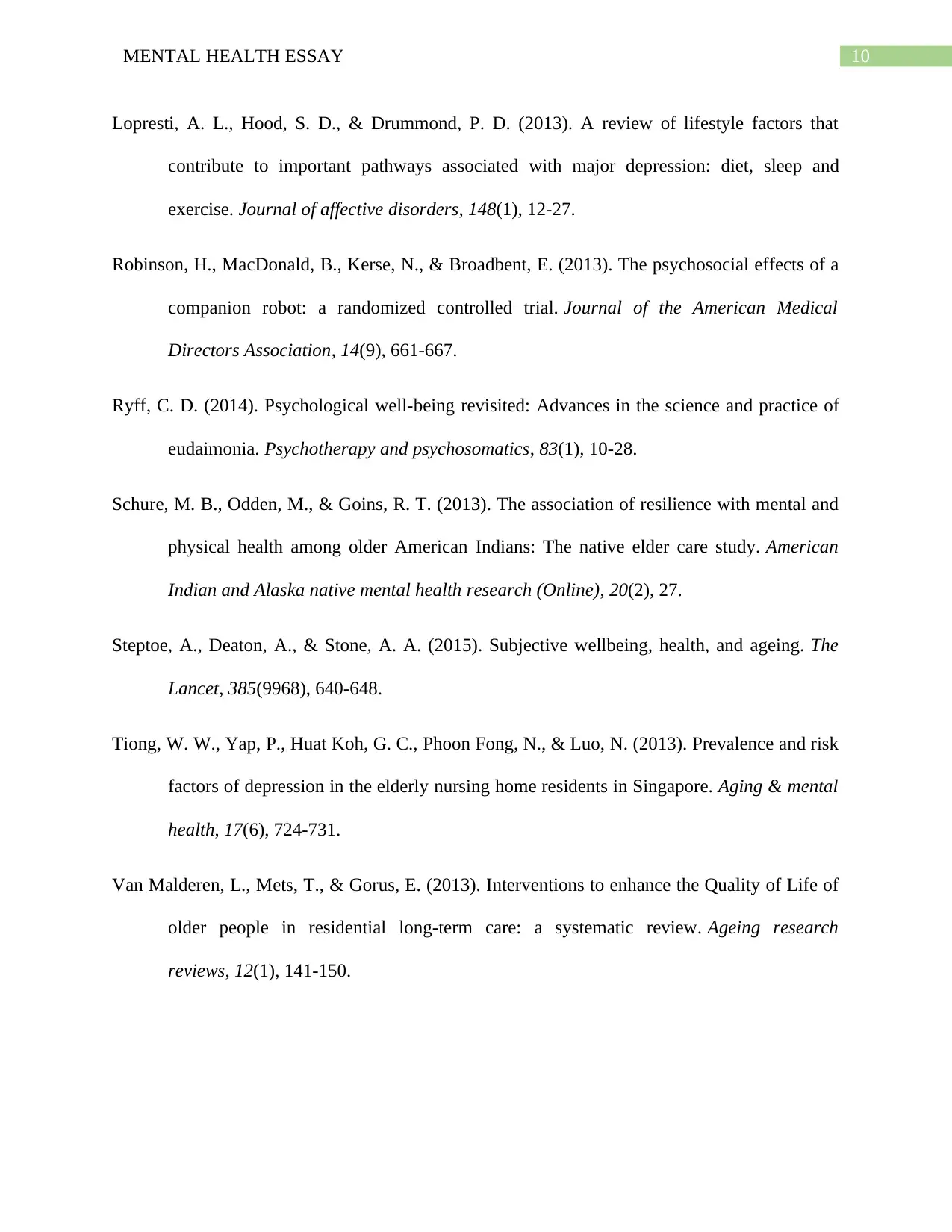
10MENTAL HEALTH ESSAY
Lopresti, A. L., Hood, S. D., & Drummond, P. D. (2013). A review of lifestyle factors that
contribute to important pathways associated with major depression: diet, sleep and
exercise. Journal of affective disorders, 148(1), 12-27.
Robinson, H., MacDonald, B., Kerse, N., & Broadbent, E. (2013). The psychosocial effects of a
companion robot: a randomized controlled trial. Journal of the American Medical
Directors Association, 14(9), 661-667.
Ryff, C. D. (2014). Psychological well-being revisited: Advances in the science and practice of
eudaimonia. Psychotherapy and psychosomatics, 83(1), 10-28.
Schure, M. B., Odden, M., & Goins, R. T. (2013). The association of resilience with mental and
physical health among older American Indians: The native elder care study. American
Indian and Alaska native mental health research (Online), 20(2), 27.
Steptoe, A., Deaton, A., & Stone, A. A. (2015). Subjective wellbeing, health, and ageing. The
Lancet, 385(9968), 640-648.
Tiong, W. W., Yap, P., Huat Koh, G. C., Phoon Fong, N., & Luo, N. (2013). Prevalence and risk
factors of depression in the elderly nursing home residents in Singapore. Aging & mental
health, 17(6), 724-731.
Van Malderen, L., Mets, T., & Gorus, E. (2013). Interventions to enhance the Quality of Life of
older people in residential long-term care: a systematic review. Ageing research
reviews, 12(1), 141-150.
Lopresti, A. L., Hood, S. D., & Drummond, P. D. (2013). A review of lifestyle factors that
contribute to important pathways associated with major depression: diet, sleep and
exercise. Journal of affective disorders, 148(1), 12-27.
Robinson, H., MacDonald, B., Kerse, N., & Broadbent, E. (2013). The psychosocial effects of a
companion robot: a randomized controlled trial. Journal of the American Medical
Directors Association, 14(9), 661-667.
Ryff, C. D. (2014). Psychological well-being revisited: Advances in the science and practice of
eudaimonia. Psychotherapy and psychosomatics, 83(1), 10-28.
Schure, M. B., Odden, M., & Goins, R. T. (2013). The association of resilience with mental and
physical health among older American Indians: The native elder care study. American
Indian and Alaska native mental health research (Online), 20(2), 27.
Steptoe, A., Deaton, A., & Stone, A. A. (2015). Subjective wellbeing, health, and ageing. The
Lancet, 385(9968), 640-648.
Tiong, W. W., Yap, P., Huat Koh, G. C., Phoon Fong, N., & Luo, N. (2013). Prevalence and risk
factors of depression in the elderly nursing home residents in Singapore. Aging & mental
health, 17(6), 724-731.
Van Malderen, L., Mets, T., & Gorus, E. (2013). Interventions to enhance the Quality of Life of
older people in residential long-term care: a systematic review. Ageing research
reviews, 12(1), 141-150.
1 out of 11
Related Documents
Your All-in-One AI-Powered Toolkit for Academic Success.
+13062052269
info@desklib.com
Available 24*7 on WhatsApp / Email
![[object Object]](/_next/static/media/star-bottom.7253800d.svg)
Unlock your academic potential
Copyright © 2020–2026 A2Z Services. All Rights Reserved. Developed and managed by ZUCOL.





